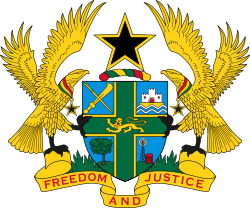 | |
| Agency overview | |
|---|---|
| Jurisdiction | Government of Ghana |
| Headquarters | |
| Minister responsible | |
| Website | www |
The Ministry of Communication, Digital Technology and Innovation is a government ministry responsible for the development of communications and technology in Ghana. The ministry's offices are in Accra, Greater Accra. [1]
Contents
The ministry's mission is to pursue policies that will lead to the creation of information and communications infrastructure, along with services to promote economic competitiveness. The missions purpose is to be in line with the policy guidelines of the Medium Term National Development Policy Framework (MTNDPF), developed as the basis of the Ghana Shared Growth and Development Agenda (GSGDA).